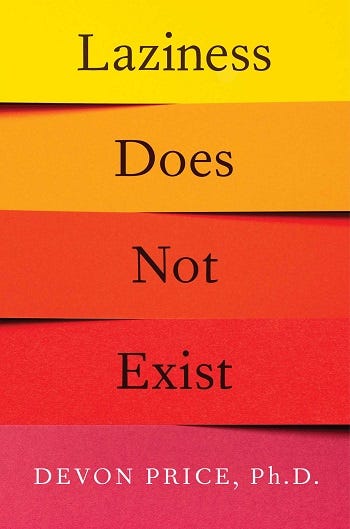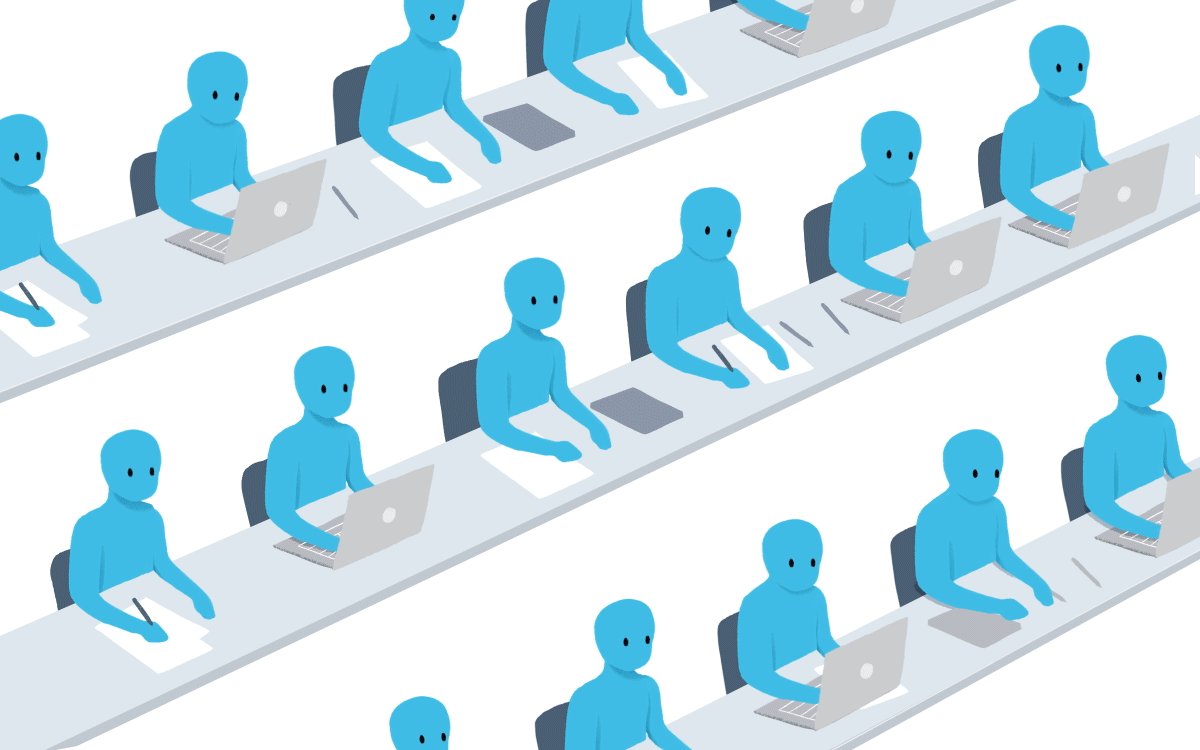Humans 101
But unseen barriers do
I've been a psychology professor since 2012. In the past six years, I've witnessed students of all ages procrastinate on papers, skip presentation days, miss assignments, and let due dates fly by. I've seen promising prospective grad students fail to get applications in on time; I've watched PhD candidates take months or years revising a single dissertation draft; I once had a student who enrolled in the same class of mine two semesters in a row, and never turned in anything either time.
I don't think laziness was ever at fault.
Ever.
In fact, I don't believe that laziness exists.
I'm a social psychologist, so I'm interested primarily in the situational and contextual factors that drive human behavior. When you're seeking to predict or explain a person's actions, looking at the social norms, and the person's context, is usually a pretty safe bet. Situational constraints typically predict behavior far better than personality, intelligence, or other individual-level traits.
So when I see a student failing to complete assignments, missing deadlines, or not delivering results in other aspects of their life, I'm moved to ask: what are the situational factors holding this student back? What needs are currently not being met? And, when it comes to behavioral "laziness," I'm especially moved to ask: what are the barriers to action that I can't see?
There are always barriers. Recognizing those barriers— and viewing them as legitimate — is often the first step to breaking "lazy" behavior patterns.
It's really helpful to respond to a person's ineffective behavior with curiosity rather than judgment. I learned this from a friend of mine, the writer and activist Kimberly Longhofer (who publishes under the name Mik Everett). Kim is passionate about the acceptance and accommodation of disabled people and homeless people. Their writing about both subjects is some of the most illuminating, bias-busting work I've ever encountered. Part of that is because Kim is brilliant, but it's also because at various points in their life, Kim has been both disabled and homeless.
Kim is the person who taught me that judging a homeless person for wanting to buy alcohol or cigarettes is utter folly. When you're homeless, the nights are cold, the world is unfriendly, and everything is painfully uncomfortable. Whether you're sleeping under a bridge, in a tent, or at a shelter, it's hard to rest easy. You are likely to have injuries or chronic conditions that bother you persistently, and little access to medical care to deal with it. You probably don't have much healthy food.
In that chronically uncomfortable, over-stimulating context, needing a drink or some cigarettes makes fucking sense. As Kim explained to me, if you're laying out in the freezing cold, drinking some alcohol may be the only way to warm up and get to sleep. If you're under-nourished, a few smokes may be the only thing that kills the hunger pangs. And if you're dealing with all this while also fighting an addiction, then yes, sometimes you just need to score whatever will make the withdrawal symptoms go away, so you can survive.

Few people who haven't been homeless think this way. They want to moralize the decisions of poor people, perhaps to comfort themselves about the injustices of the world. For many, it's easier to think homeless people are, in part, responsible for their suffering than it is to acknowledge the situational factors.
And when you don't fully understand a person's context — what it feels like to be them every day, all the small annoyances and major traumas that define their life — it's easy to impose abstract, rigid expectations on a person's behavior. All homeless people should put down the bottle and get to work. Never mind that most of them have mental health symptoms and physical ailments, and are fighting constantly to be recognized as human. Never mind that they are unable to get a good night's rest or a nourishing meal for weeks or months on end. Never mind that even in my comfortable, easy life, I can't go a few days without craving a drink or making an irresponsible purchase. They have to do better.
But they're already doing the best they can. I've known homeless people who worked full-time jobs, and who devoted themselves to the care of other people in their communities. A lot of homeless people have to navigate bureaucracies constantly, interfacing with social workers, case workers, police officers, shelter staff, Medicaid staff, and a slew of charities both well-meaning and condescending. It's a lot of fucking work to be homeless. And when a homeless or poor person runs out of steam and makes a "bad decision," there's a damn good reason for it.
If a person's behavior doesn't make sense to you, it is because you are missing a part of their context. It's that simple. I'm so grateful to Kim and their writing for making me aware of this fact. No psychology class, at any level, taught me that. But now that it is a lens that I have, I find myself applying it to all kinds of behaviors that are mistaken for signs of moral failure — and I've yet to find one that can't be explained and empathized with.
Let's look at a sign of academic "laziness" that I believe is anything but: procrastination.
People love to blame procrastinators for their behavior. Putting off work sure looks lazy, to an untrained eye. Even the people who are actively doing the procrastinating can mistake their behavior for laziness. You're supposed to be doing something, and you're not doing it — that's a moral failure right? That means you're weak-willed, unmotivated, and lazy, doesn't it?
For decades, psychological research has been able to explain procrastination as a functioning problem, not a consequence of laziness. When a person fails to begin a project that they care about, it's typically due to either a) anxiety about their attempts not being "good enough" or b) confusion about what the first steps of the task are. Not laziness. In fact, procrastination is more likely when the task is meaningful and the individual cares about doing it well.
When you're paralyzed with fear of failure, or you don't even know how to begin a massive, complicated undertaking, it's damn hard to get shit done. It has nothing to do with desire, motivation, or moral upstandingness. Procastinators can will themselves to work for hours; they can sit in front of a blank word document, doing nothing else, and torture themselves; they can pile on the guilt again and again — none of it makes initiating the task any easier. In fact, their desire to get the damn thing done may worsen their stress and make starting the task harder.
The solution, instead, is to look for what is holding the procrastinator back. If anxiety is the major barrier, the procrastinator actually needs to walk away from the computer/book/word document and engage in a relaxing activity. Being branded "lazy" by other people is likely to lead to the exact opposite behavior.
Often, though, the barrier is that procrastinators have executive functioning challenges — they struggle to divide a large responsibility into a series of discrete, specific, and ordered tasks. Here's an example of executive functioning in action: I completed my dissertation (from proposal to data collection to final defense) in a little over a year. I was able to write my dissertation pretty easily and quickly because I knew that I had to a) compile research on the topic, b) outline the paper, c) schedule regular writing periods, and d) chip away at the paper, section by section, day by day, according to a schedule I had pre-determined.
Nobody had to teach me to slice up tasks like that. And nobody had to force me to adhere to my schedule. Accomplishing tasks like this is consistent with how my analytical, Autistic, hyper-focused brain works. Most people don't have that ease. They need an external structure to keep them writing — regular writing group meetings with friends, for example — and deadlines set by someone else. When faced with a major, massive project, most people want advice for how to divide it into smaller tasks, and a timeline for completion. In order to track progress, most people require organizational tools, such as a to-do list, calendar, datebook, or syllabus.
Needing or benefiting from such things doesn't make a person lazy. It just means they have needs. The more we embrace that, the more we can help people thrive.
I had a student who was skipping class. Sometimes I'd see her lingering near the building, right before class was about to start, looking tired. Class would start, and she wouldn't show up. When she was present in class, she was a bit withdrawn; she sat in the back of the room, eyes down, energy low. She contributed during small group work, but never talked during larger class discussions.
A lot of my colleagues would look at this student and think she was lazy, disorganized, or apathetic. I know this because I've heard how they talk about under-performing students. There's often rage and resentment in their words and tone — why won't this student take my class seriously? Why won't they make me feel important, interesting, smart?
But my class had a unit on mental health stigma. It's a passion of mine, because I'm a neuroatypical psychologist. I know how unfair my field is to people like me. The class & I talked about the unfair judgments people levy against those with mental illness; how depression is interpreted as laziness, how mood swings are framed as manipulative, how people with "severe" mental illnesses are assumed incompetent or dangerous.
The quiet, occasionally-class-skipping student watched this discussion with keen interest. After class, as people filtered out of the room, she hung back and asked to talk to me. And then she disclosed that she had a mental illness and was actively working to treat it. She was busy with therapy and switching medications, and all the side effects that entails. Sometimes, she was not able to leave the house or sit still in a classroom for hours. She didn't dare tell her other professors that this was why she was missing classes and late, sometimes, on assignments; they'd think she was using her illness as an excuse. But she trusted me to understand.
And I did. And I was so, so angry that this student was made to feel responsible for her symptoms. She was balancing a full course load, a part-time job, and ongoing, serious mental health treatment. And she was capable of intuiting her needs and communicating them with others. She was a fucking badass, not a lazy fuck. I told her so.
She took many more classes with me after that, and I saw her slowly come out of her shell. By her Junior and Senior years, she was an active, frank contributor to class — she even decided to talk openly with her peers about her mental illness. During class discussions, she challenged me and asked excellent, probing questions. She shared tons of media and current-events examples of psychological phenomena with us. When she was having a bad day, she told me, and I let her miss class. Other professors — including ones in the psychology department — remained judgmental towards her, but in an environment where her barriers were recognized and legitimized, she thrived.

Over the years, at that same school, I encountered countless other students who were under-estimated because the barriers in their lives were not seen as legitimate. There was the young man with OCD who always came to class late, because his compulsions sometimes left him stuck in place for a few moments. There was the survivor of an abusive relationship, who was processing her trauma in therapy appointments right before my class each week. There was the young woman who had been assaulted by a peer — and who had to continue attending classes with that peer, while the school was investigating the case.
These students all came to me willingly, and shared what was bothering them. Because I discussed mental illness, trauma, and stigma in my class, they knew I would be understanding. And with some accommodations, they blossomed academically. They gained confidence, made attempts at assignments that intimidated them, raised their grades, started considering graduate school and internships. I always found myself admiring them. When I was a college student, I was nowhere near as self-aware. I hadn't even begun my lifelong project of learning to ask for help.
Students with barriers were not always treated with such kindness by my fellow psychology professors. One colleague, in particular, was infamous for providing no make-up exams and allowing no late arrivals. No matter a student's situation, she was unflinchingly rigid in her requirements. No barrier was insurmountable, in her mind; no limitation was acceptable. People floundered in her class. They felt shame about their sexual assault histories, their anxiety symptoms, their depressive episodes. When a student who did poorly in her classes performed well in mine, she was suspicious.
It's morally repugnant to me that any educator would be so hostile to the people they are supposed to serve. It's especially infuriating, that the person enacting this terror was a psychologist. The injustice and ignorance of it leaves me teary every time I discuss it. It's a common attitude in many educational circles, but no student deserves to encounter it.
I know, of course, that educators are not taught to reflect on what their students' unseen barriers are. Some universities pride themselves on refusing to accommodate disabled or mentally ill students — they mistake cruelty for intellectual rigor. And, since most professors are people who succeeded academically with ease, they have trouble taking the perspective of someone with executive functioning struggles, sensory overloads, depression, self-harm histories, addictions, or eating disorders. I can see the external factors that lead to these problems. Just as I know that "lazy" behavior is not an active choice, I know that judgmental, elitist attitudes are typically borne out of situational ignorance.
And that's why I'm writing this piece. I'm hoping to awaken my fellow educators — of all levels — to the fact that if a student is struggling, they probably aren't choosing to. They probably want to do well. They probably are trying. More broadly, I want all people to take a curious and empathic approach to individuals whom they initially want to judge as "lazy" or irresponsible.
If a person can't get out of bed, something is making them exhausted. If a student isn't writing papers, there's some aspect of the assignment that they can't do without help. If an employee misses deadlines constantly, something is making organization and deadline-meeting difficult. Even if a person is actively choosing to self-sabotage, there's a reason for it — some fear they're working through, some need not being met, a lack of self-esteem being expressed.
People do not choose to fail or disappoint. No one wants to feel incapable, apathetic, or ineffective. If you look at a person's action (or inaction) and see only laziness, you are missing key details. There is always an explanation. There are always barriers. Just because you can't see them, or don't view them as legitimate, doesn't mean they're not there. Look harder.
Maybe you weren't always able to look at human behavior this way. That's okay. Now you are. Give it a try.
If you found this essay illuminating at all, please consider buying Kim Longhofer / Mik Everett's book, Self-Published Kindling: Memoirs of a Homeless Bookstore Owner. The ebook is $3; the paperback is $15.
Kim also runs a fat-positive, cripplepunk page called Change Like the Moon: Accept Every Body at Every Phase.



